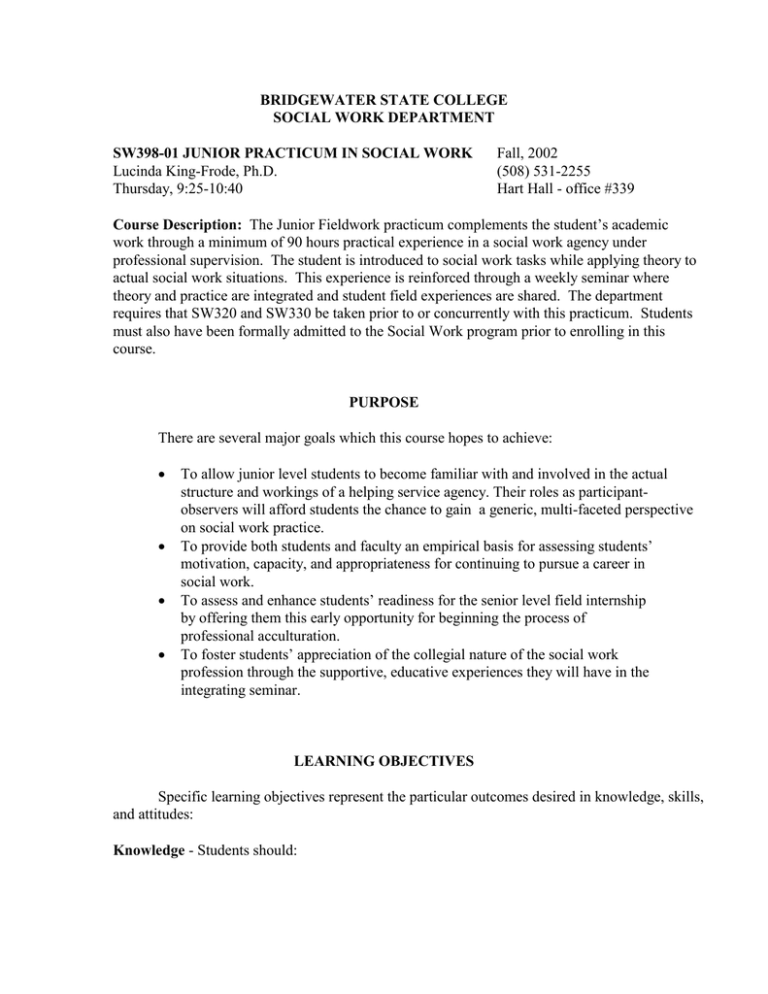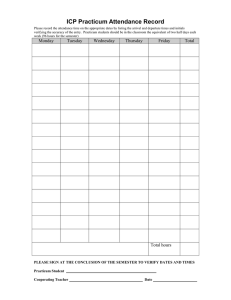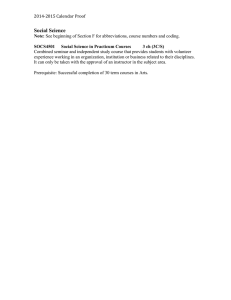BRIDGEWATER STATE COLLEGE SOCIAL WORK DEPARTMENT SW398-01 JUNIOR PRACTICUM IN SOCIAL WORK
advertisement

BRIDGEWATER STATE COLLEGE SOCIAL WORK DEPARTMENT SW398-01 JUNIOR PRACTICUM IN SOCIAL WORK Lucinda King-Frode, Ph.D. Thursday, 9:25-10:40 Fall, 2002 (508) 531-2255 Hart Hall - office #339 Course Description: The Junior Fieldwork practicum complements the student’s academic work through a minimum of 90 hours practical experience in a social work agency under professional supervision. The student is introduced to social work tasks while applying theory to actual social work situations. This experience is reinforced through a weekly seminar where theory and practice are integrated and student field experiences are shared. The department requires that SW320 and SW330 be taken prior to or concurrently with this practicum. Students must also have been formally admitted to the Social Work program prior to enrolling in this course. PURPOSE There are several major goals which this course hopes to achieve: To allow junior level students to become familiar with and involved in the actual structure and workings of a helping service agency. Their roles as participantobservers will afford students the chance to gain a generic, multi-faceted perspective on social work practice. To provide both students and faculty an empirical basis for assessing students’ motivation, capacity, and appropriateness for continuing to pursue a career in social work. To assess and enhance students’ readiness for the senior level field internship by offering them this early opportunity for beginning the process of professional acculturation. To foster students’ appreciation of the collegial nature of the social work profession through the supportive, educative experiences they will have in the integrating seminar. LEARNING OBJECTIVES Specific learning objectives represent the particular outcomes desired in knowledge, skills, and attitudes: Knowledge - Students should: 1. Know the agency in which they are placed thoroughly, including its funding source, chain of command, authority and mandate, and professional disciplines and roles. 2. Become familiar with the population served by the agency, including socioeconomic status, racial and ethnic characteristics, other demographic factors, and the typical issues and problems with which they present. 3. Become familiar with the range of social/helping services in the local area and learn how their agency fits into the larger social service network. 4. Know the community in which the agency and its population are located. 5. Learn the social work role in that agency, including its daily activities, responsibilities, rights, and constraints. 6. Show appreciation of the fact that the social work intervention should be an orderly process in which assessment serves as a foundation for social work intervention. 7. Show that they understand the social systems approach and its relevance to assessment and intervention planning. 8. Show awareness that practice should be based on sound theoretical principles. Skills - Students should: 1. Become good observers; i.e., show evidence that they can discern the significant from the trivial, can recognize subtleties, nuances, and both verbal and non-verbal communication. 2. Be able to communicate observations in written and oral form. 3. Be able to relate to co-workers, supervisor, and agency client population in a professionally appropriate manner. 4. Be able to write adequately; i.e., with acceptable grammar, spelling, and syntax. 5. Show awareness of the need for record-keeping and documentation in social work practice. 6. Show evidence of the ability to relate to client populations with empathy, respect, and understanding. 7. Be responsible about meeting obligations and dependable about fulfilling assigned tasks. 2 Attitudes - Students should: 1. Show unfailing awareness of the respect for the confidential nature of work with clients. 2. Show that appropriate social work values and ethics are being incorporated into their practice orientation. 3. Show awareness of how prevailing biases, stereotypes, and attitudes can affect one’s own and others’ service provision. 4. Be able to bring to conscious awareness their own reactions to clients and client problems. 5. Be able to recognize stereotypic, biased, and prejudiced responses in themselves and others in helping services. 6. Indicate growing self-knowledge; i.e., awareness of own areas of strength and vulnerability, and of the need for development in knowledge, skills, and/or attitudes. SYLLABUS WEEK 1 9/5 A. Get acquainted. Present course outline, goals, field assignments, and brief overview of field expectations. B. Agency Screening Interview: Discuss what to expect and questions to be asked during an agency interview. Review course and practicum objectives. C. Hand out “Settling In” and address related questions. D. Fill out “pre-test” forms (brief). WEEK 2 9/12 A. Review assignments relating to the required weekly log. Discuss professional supervision and examine the differing roles of the on-site supervisor and the classroom instructor. B. Discuss feedback from students who have had agency interviews. C. Address questions from reading or interviews: What are your hopes, fears, expectations, and uncertainties? How can you feel better prepared and more self-confident? WEEK 3 9/19 A. Placements begin. Discuss first impressions and observations of the agency: What do you observe about the agency, how it operates, who uses its services, etc.? How does it feel to walk in? What have you 3 learned about its structure and social workers’ roles within it? What are the lines of authority in the agency? What is the ethnic composition of the client population, of the staff, and of the community? B. Reading material handed out: Voluntary and involuntary clients. WEEK 4 9/26 A. Discussion on the handout: Ethical concerns with involuntary clients and the role of the social worker in promoting autonomy. Discuss social justice issues and oppression in the area of self-determination. Address the role of agency and social policy in this area. How is policy made or changed? B. Explore concerns and questions from class with regard to the initial phase of the practicum. Encourage use of on-site practicum experiences. Identify strengths students bring to the practicum: personality traits, prior life or work experience, attitude of openness or caring, etc. WEEK 5 10/3 A. Identify what are the presenting problems of the client. Focus on the use of assessment at the initial phase, using students’ understanding of human behavior and development within the context of culture and society. Discuss the process and components associated with contracting and problem-solving. B. Check in with issues at the practicum agencies. Present situations and and discuss from the points of view of various levels of practice (micro, macro, etc.), policy, and understanding of people’s needs. C. Discuss issue of difference: In what ways are you similar to and different from the agency’s clients? What is the significance of these differences for the work? Discuss differences in a variety of areas: race/ethnicity, gender, “class”/income group, sexual orientation, health or mental health status, life experiences, ability level in various arenas, education, age, etc. WEEKS 6-11 A. Individual presentations and class discussion. Students should submit an 10/10-11/14 outline of their presentations on the day of their presentations. Class members are expected ask questions reflecting their growing knowledge of and comfort with human behavior theories, social work interventions, and agency practices. PAPER DUE week November 14 (or earlier) WEEK 12 11/21 A. Discussion of topics identified as “learning needs” and students’ papers. B. Discussion of termination and its significance for clients, the agency, the student, and each relationship formed over the semester. 4 WEEK 13 12/6 A. Field evaluations (filled out and signed by supervisor) are due. B. Summary of practice and policy issues encountered during the semester, and of ethical dilemmas related to situations observed or encountered in the agency over the course of the semester, such as inequitable distribution of resources, discriminatory practices, unfair decisions, oppressive policies in government or agency networks, problems in confidentiality, paternalism towards clients or client groups, and competing interests or agendas (of clients, agencies, family members, social workers, etc.) COURSE ASSIGNMENTS LOG: Refer to Guidelines. Logs should be typed if handwriting is not easily legible. Logs are due weekly. FIELD PERFORMANCE: Grade will be based on the student’s ability to meet the learning objectives stated for SW398 Junior Practicum in Social Work. Refer to the Learning Objectives. Final evaluations are to be completed with the supervisor and should be handed in on Week 12. See “FIELD EXPECTATIONS” below. PRESENTATION: Prepare a brief (15-20 minutes) presentation to deliver to your classmates. It’s purpose is to acquaint the class with your particular agency. At the end of your talk listeners should have been given enough information to make an informed referral to your agency. Give a sense of the agency’s purpose, how clients are welcomed (or not), how effective the services are, diversity issues (re: clients and staff), and what the work atmosphere is like for social workers at the agency. This report should include the following information: the agency’s mission the funding sources for the agency; its chain of command and other structure(s); the social worker’s role and position in the agency; the relationship of social work to other disciplines and to the agency mandate; the primary agency referral/resource network; the characteristics of the agency’s client population, including socioeconomic status, ethnicity, race, religion, and other important factors; typical problems with which the clients present; and the agency program(s) designed to meet client needs. The report should include your evaluation of the effectiveness of the agency in fulfilling its objectives. You may choose to use agency literature for information, or turn to the 5 professional literature. Reminder: Students should submit a comprehensive outline of their presentations on the day they present in class. PAPER (5-7 pages, due during Week 11): As you begin to become familiar with your field agency and its clients, you should identify an issue with which a client typically presents (a “presenting complaint”). Putting yourself in the shoes of a client experiencing this difficulty, do the following: Investigate what the professional literature says about the topic – its prevalence, relevant theories about causes and modes of intervention. Determine how your agency addresses the problem. What do your colleagues say about the issue? How do you feel about their reactions? Describe your contact (if any) with clients effected by this issue. What has this experience been like? Describe the nature of your relationship to a client(s) who has been effected by this problem. Try to assess how effective the agency’s intervention has been/ Does the agency undertake any structured evaluation of its services? Do you think there are additional or different interventions that should be undertaken? If so, why?’s intervention(s) seem effective? Do you think there are additional or different interventions that should be undertaken? Students should incorporate at least two citations (APA format) from the professional literature into their papers; you may also use agency literature, magazines and books. Papers should be typewritten in a 12 point font and double-spaced, and are due during Week 11. Lateness will result in a lowered grade. NOTE: It is recommended that you begin considering your topic early in the semester, so that you can observe over the semester how your issue is addressed in your agency and how you have related to it and to clients involved. CLASS PARTICIPATION: The student will be graded on participation, class attendance, and commitment to course. Regular attendance is expected and required. In addition, students are expected to make comments on relevant issues and share examples from their practice. Missing classes or repeated lateness will cause the grade to be lowered. Assignments are due on the dates stated. FIELD EXPECTATIONS Students will be expected to spend 90 hours in the field agency during one semester. For most, this will probably mean spending two half-days (or one full day) a week in the field site. At least one half-hour hour a week of on-site, structured supervision from a helping service agency professional will be required. Such time 6 should be used to assure students of the opportunity to ask questions, seek additional chances for learning - perhaps about other aspects of the agency - receive task assignments, and gain feedback from the supervisor about the quality of their performance. Such structured contact will also allow the supervisor to make a more knowledgeable assessment of the student’s learning progress. If two or more students are placed under the same supervisor, an hour of group supervision may be used in place of the individual supervisory time. Supervisors are urged to share questions or concerns about students’ field progress with the responsible college faculty member. If necessary, a meeting can be arranged between the student supervisor and the instructor to resolve any issues. At the end of the practicum, supervisors will be asked to participate in the student’s final evaluation. Supervisors will be given a form on which they will be able to make a written assessment of the student’s overall progress. This evaluation should be reviewed by the student and signed by both the supervisor and student. In addition, the faculty field advisor will talk with agency supervisors by phone in order to identify student strengths and areas for growth – especially in terms of relationships with clients, conceptual understanding and writing skills – and to identify possible senior placement sites. Ideally, the field learning will be undergirded and reinforced by its accompanying once-weekly seminar at the college. Class material and assignments will be drawn from the actual experiences students are undergoing, and they will be formulated to integrate practice theory with practice experience. The seminar will have the additional benefits of broadening students’ knowledge about agencies other than their own and of offering them peer support. GUIDELINES FOR DAILY FIELD LOG The required log serves as a journal in which your daily activities in the field agency, and your responses to the events of your day on site, are detailed. Agency supervisors should know that the log is shared only with your college instructor. Therefore, in addition to discussing the knowledge and skills you believe you are gaining, you are free to discuss openly your array of feelings, whether they reflect apprehension, satisfaction, discomfort, pleasure, or other emotions. Overall, you should aim to give as clear a picture as possible of your experiences and of the significance of those experiences for you. The log entries should show your capacity to reflect on what you are observing and experiencing at your field agency, not just to report a list of your activities. It provides an opportunity for the student and instructor to have an individual dialogue about the experiences. CAUTION: The log should not be used as a means of ventilating or working through personal problems not related to the field experience. 7 WRITING GUIDELINES: Logs should approximate 2 double-spaced typed or 3-4 hand-written pages weekly. Logs should be kept in a 3-ring, loose-leaf binder. Submit current log entry only in your weekly seminar. Be sure to put your name on your log and date it. Leave a margin for the instructor’s comments on the left side. Please write legibly or type. CRITERIA FOR GRADING THE LOG: Writing Proficiency: Use of standard English form, grammar, spelling, punctuation. Development of Professional Writing Style: Correct use of technical language appropriate to the case situation and agency style. Evidence of Observational Skills: Demonstration of the ability to observe, to interpret verbal and non-verbal communications, to listen with the “third ear,” and to identify clients’service needs. Understanding of Agency Purpose and Function: Knowledge of bureaucratic structure and understanding of agency mandate, policy, and practice, including personal practices. Development of Self-Awareness: Growing knowledge of one’s own attitudes, values, perspectives, and learning needs, and recognition that these factors affect the professional relationship. Critical Thinking Skills: Ability to assess the impact of agency policy and practice on clients, to identify effective practice, to recognize bias and discrimination in policy and practice, and to understand interaction patterns within the agency and its context. Your log should show evidence of theory/practice integration. GRADING Basis and Criteria for Grading: The following basis will be used for grading: Field Performance 50% Field Log 15% Paper 15% Presentation 10% Class Participation 10% 8 It is difficult to state rigid standards for each grade; however, the following outline should give direction and information on expectations: “A” Range - Superior performance in the field; regular class attendance; consistent class participation; and superior completion of assignments, indicating an excellent grasp of course material, with fully documented reference material. “B” Range - Good performance in the field; regular class attendance and participation; and well-prepared assignments, indicating a good understanding of course subject matter, with fully documented reference material. “C” Range - Satisfactory performance in the field; regular class attendance; some class participation; and acceptably completed assignments with fully documented reference material. “D” Range - Poor performance in the field; inconsistent class attendance; and/or poorly or sketchily completed assignments. “E” Range - Failure in the field; poor class attendance; non-completion of assignments; and/or submission on non-original work. 9



